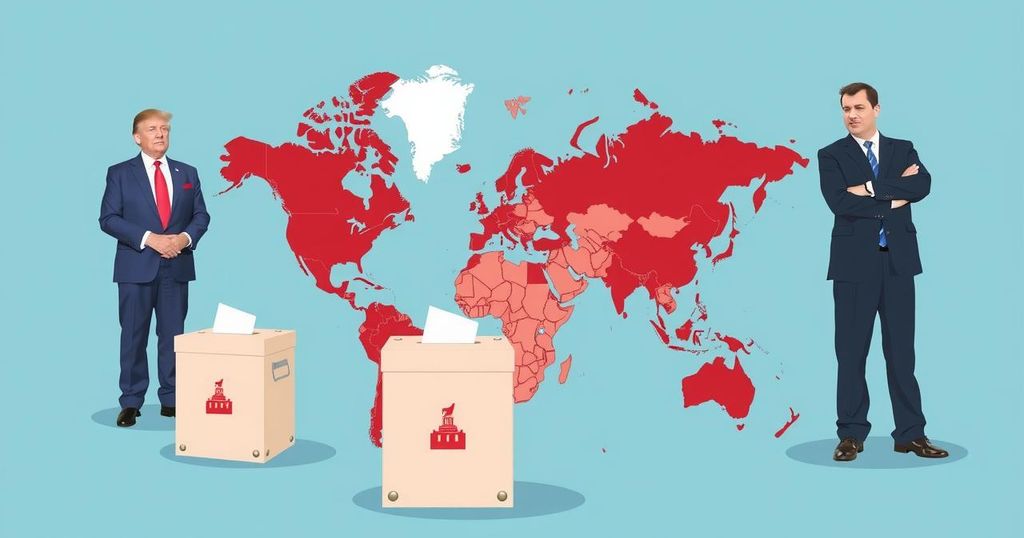In 2024, over 70 national elections affected half the global population, with an unprecedented decline in support for incumbent parties. Major democracies like the United States and India faced significant electoral losses, signaling widespread anti-incumbent sentiment. Analysts attribute this trend to economic dissatisfaction, challenges post-pandemic, and growing political alienation among voters. Upcoming elections in 2025 will be critical to observe if this trend continues.
In the significant electoral year of 2024, over 70 national elections were conducted worldwide, impacting more than half of the global population. Major democracies such as India, the United States, and Indonesia participated, alongside the European Parliament elections involving 27 European member states, according to the International Institute for Democracy and Electoral Assistance (International IDEA). The total ballots cast exceeded 1.6 billion, reflecting a widespread engagement in democratic processes.
The electoral outcomes in 2024 marked a considerable shift against incumbent governments, as evidenced by a Financial Times analysis indicating a decline in vote share for all incumbent parties in developed nations. This trend represented a stark historical shift, as such a phenomenon had not been recorded in nearly 120 years. An analysis by ABC News’ 538 revealed that in over 80% of countries, incumbent parties either lost seats or experienced a decrease in their vote share, a pattern observed across both left and right political spectrums globally.
Incumbent parties faced setbacks in numerous regions; for instance, in the United States, former President Donald Trump regained battleground states, while in Portugal, the center-right Democratic Alliance made significant gains. Concurrently, left-leaning parties captured victories, notably in Britain’s parliamentary elections and South Korea’s parliamentary results led by liberal opposition parties.
Some incumbents managed to retain power but with diminished majorities, such as India’s Narendra Modi, who lost his outright majority yet continued to govern through alliances. Conversely, electoral management in less democratic regions allowed some leaders to secure overwhelming victories, like Rwanda’s Paul Kagame, who won 99% of the vote. Nonetheless, signs of dissent emerged, evidenced by increased opposition in Bangladesh and moderate electoral outcomes in Iran.
Analysts attribute these shifts largely to dissatisfaction with global economic conditions and rising costs. A Pew Research Center survey highlighted that Mexico’s incumbent party succeeded due to relatively favorable economic perceptions. Other challenges, such as significant migration flows and the repercussions of pandemic disruptions, contributed to widespread voter frustration.
Moreover, the appeal of democracy itself has waned, with a median of 59% of respondents in 24 democracies expressing dissatisfaction with the current democratic processes in their countries. The survey underscored a widespread belief that elected officials do not adequately represent the public’s interests, leading to a sense of political alienation among the electorate.
Looking ahead, while 2025 may not witness the same level of electoral activity as 2024, pivotal elections in countries such as Argentina, Australia, Canada, Japan, and the Philippines will be crucial in determining the future trajectory of incumbency and public sentiment towards governance.
The 2024 elections stood out as a significant turning point in global politics, showcasing a trend where incumbent leaders faced unprecedented challenges in maintaining their governance. With over 70 elections held, encompassing major democracies and the European Parliament, the electoral landscape revealed a strong current of public dissent against established political parties. This phenomenon reflects deeper societal issues, including economic hardship and disillusionment with democratic processes, suggesting that candidates may need to address these grievances to remain relevant in future elections.
The electoral landscape of 2024 highlighted a substantial wave of anti-incumbent sentiment across various democratic nations, resulting in significant political shifts. With a noted decline in support for incumbent parties and growing voter dissatisfaction rooted in economic challenges and perceived failures of democracy, future elections may continue to reflect these trends. As the international community anticipates the upcoming elections in 2025, the resilience of established parties will be put to the test against rising public expectations and calls for authentic representation.
Original Source: www.voanews.com






